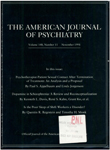Genetics and psychiatry: past discoveries, current dilemmas, and future directions
Abstract
Family, twin, and adoption studies have suggested an important role for hereditary factors in the etiology and pathogenesis of several psychiatric disorders. Advances in molecular and statistical genetics may very well reveal the identity of these factors, which may include single genes. Linked markers, critical to the discovery of abnormal genes in several medical conditions, have been reported for Huntington's disease, Alzheimer's disease, bipolar disorder, and schizophrenia. Psychiatric disorders pose particular problems (etiologic heterogeneity, incomplete penetrance, variable expressivity) for genetic research. New practical and ethical questions also arise. Nevertheless, knowledge may emerge that will suggest new approaches to diagnosis, prevention, and treatment.
Access content
To read the fulltext, please use one of the options below to sign in or purchase access.- Personal login
- Institutional Login
- Sign in via OpenAthens
- Register for access
-
Please login/register if you wish to pair your device and check access availability.
Not a subscriber?
PsychiatryOnline subscription options offer access to the DSM-5 library, books, journals, CME, and patient resources. This all-in-one virtual library provides psychiatrists and mental health professionals with key resources for diagnosis, treatment, research, and professional development.
Need more help? PsychiatryOnline Customer Service may be reached by emailing [email protected] or by calling 800-368-5777 (in the U.S.) or 703-907-7322 (outside the U.S.).



